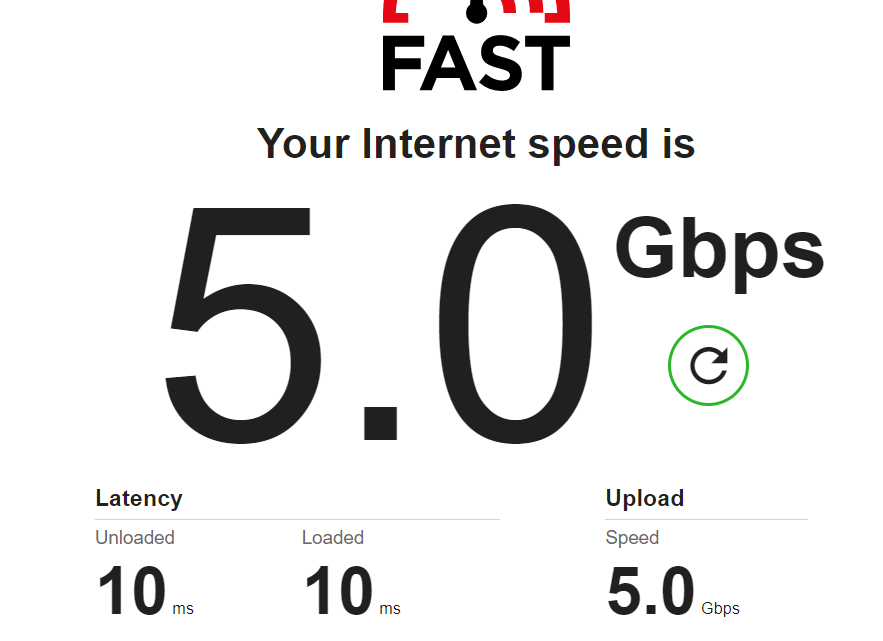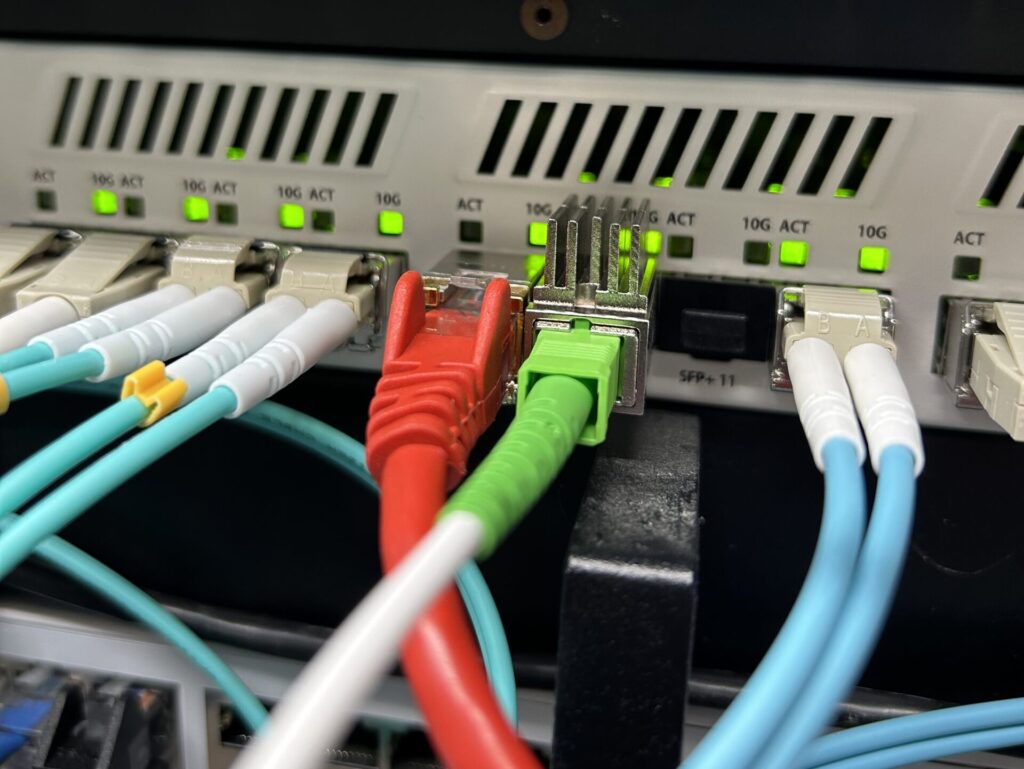
This year has seen more and more providers offering Multi-Gigabit Broadband but is it just all hype or is Multi-Gigabit Broadband worth upgrading to?
In this blog we will cover what Multi-Gigabit Broadband means, how much it costs and the pros and cons in a residential setting.
What is Multi-Gigabit Broadband?
Multi-Gigabit (or ‘multi gig’ for short ) Broadband is a term that describes an internet connection with speeds over 1Gbps.
Common speed packages for Multi-Gigabit Broadband packages are 1.8Gbps, 2Gbps, 2.5Gbps, 8Gbps and 10Gbps.
While Multi-Gigabit Broadband packages have been available for business for a number of years commonly sold as expensive Leased Line products we are now starting to see Multi-Gigabit Broadband packages for residential users and this blog will be referring to Multi-Gigabit Broadband in a residential sense.
How much does Multi-Gigabit Broadband cost?
Multi-Gigabit Broadband for residential customers cost’s between £40 – £150 per month depending on provider and speed package.
The below lists the current Multi-Gigabit Broadband providers and their current prices (correct as of 04/11/2024).
Use our Fibre Broadband checker to find out what you can get.
Virgin Media now offer a 2Gbps symmetric package for around £76 per month this is only available in XGS-PON areas read more about that here
Openreach now offer multi gig packages via their national FTTP network as either a 1.2gbps/120mbps or 1.8gbps/120mbps service.
Not all Openreach ISP’s offer the multi-gig packages prices are around £60-80 per month.
Alt net Full Fibre Ltd aka Fibre Heroes now offer packages upto 2.3Gbps symmetric on their XGSPON powered FTTP network.
BeFibre now offer the new 2.3Gbps symmetric package for £50 per month (£25 per month for first 3 months until 1st December 2024).
IDNet also sell the new multi gig packages on their network for around £75 per month.
Youfibre the ISP arm of Netomina offer a 2Gbps and a 8Gbps symmetric multi gig packages from £49.99 per month.
- Coverage: National via Netomnia
B4RN (Broadband for the Rural North Ltd) offer a 10Gbps symmetric package on request for £150 /month
- Coverage: Lancashire , Cumbria , Yorkshire , Norfolk , Suffolk , Essex , Cheshire , Northumberland
London based Community Fibre offer a 3Gbps symmetric plan for around £56 per month.
- Coverage: Parts of London
- Speed: 2Gbps
- Price: £129.99/month
- Setup fee: £0
- Contract length: 24 Months
- Coverage: Parts of Northern Ireland also parts of Cumbria, Northumberland and North Yorkshire.
- Speed: 2.5 Gbps Symmetric.
- Price: £99/month
- Setup fee: £100
- Contract length: 24 Months
- Coverage: Parts of East Sussex
- Speed: 2Gbps Symmetric.
- Price: £64.99/month
- Setup fee: £0
- Contract length: 24 Months
- Coverage: Parts of East Lothian in Scotland.
Alt net Zzoomm offer a 2Gbps symmetric package for £54.95 per month
- Coverage: Parts of Berkshire, Oxfordshire, Herefordshire, North Yorkshire, Staffordshire, Cheshire
Connect Fibre which aims to cover 100,000 premises in the East of England has now launched a 2Gbps symmetric package.

Multi-Gigabit Broadband Pros and Cons
As you can see from the above Multi-Gigabit Broadband an be quite pricey the question is, is it worth upgrading?
To take advantage of Multi-Gigabit Broadband you need to have devices that can support the speed this includes your router as well as the devices connected to your router.
For the 2-2.5Gbps packages you will need your home network to support at least 2.5Gbps and for future proofing and to take advantage of the higher speed Multi-Gigabit Broadband such as You Fibres 8Gbps package you need to be equipped with 10Gbps capable equipment.
While the cost of 2.5 and 10Gbps network equipment and devices has come down there is still a premium to be paid.
At the very least you need your Router and say your PC to be multi gig capable which can cost £100’s.
Getting over 1Gbps over Wi-Fi is challenging and requires WiFi 6e or above in order to achieve it and even then your not going to get anywhere near 8Gbps.
To give a real world example I have been testing a 5Gbps internet connection and in order to get the full 5Gbps speeds I am using a 10Gbps capable enterprise router now worth £600 (was £3000 new), 10Gbps network switch which cost £250, my main PC which has a 10GbE PCIE card I got 2nd hand for £75 then all the fibre cables and SFP+ modules I estimate around £1000 for all the kit (excluding the cost of the PC) .
Luckily in most cases the ISP will provide you with a router capable of the speeds of your chosen package that just leaves you the cost of the network card and cables.
Setup cost’s aside the other main con of Multi-Gigabit Broadband is currently there is not a lot of services out there that can take advantage of Multi-Gigabit Broadband.
During my testing of my 5Gbps service I quickly found a lot of popular services only ran at speeds under 1Gbps usually around 500mbps.
Aside from speed test websites I found that only select services took advantage of speeds over 1Gbps namely Steam and Microsoft.
Even with Steam I was not able too fully saturate my 5Gbps connection as it seemed my CPU (I9-9900K) was the next bottleneck.
There are of course advantages of having Multi-Gigabit Broadband the main one being in most cases your internet speed to the house is no longer the bottleneck.
If your an avid gamer who has a powerful PC you will be able to download games and game updates much faster.
For busy households where 1Gbps internet is causing you problems say your all trying to download the latest game at the same time then Multi-Gigabit Broadband will help.

Conclusion
I think its great that more and more providers are offering Multi-Gigabit Broadband and while for most people speeds of 1Gbps or lower are more than ample there are use cases where Multi-Gigabit Broadband can help take away current internet bottlenecks.
As the internet and technology grows more services will be able to offer Multi-Gigabit speeds and as history has shown demand for faster internet will grow and in a few years Multi-Gigabit Broadband will be the norm.
The next few years will see more multi gigabit packages launched and prices will come down.